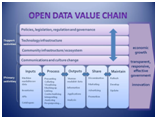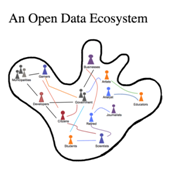OPEN DATA: DATA FOR FREE OR FREE DATAS? WHAT’S THE IMPACT?
January 31, 2014
The European Union has for years been stressing the goal of opening up data as a resource for innovative products and services and as a means of addressing societal challenges and fostering government transparency.
In June 2013, the G8 reinforced that message in order to push the Open Data initiative based on 5 principles:
- Principle 1: Open Data by Default
- Principle 2: Quality and Quantity
- Principle 3: Usable by All
- Principle 4: Releasing Data for Improved Governance
- Principle 5: Releasing Data for Innovation
Working on this topic for clients, I have had the opportunity to share my views on the Open Data Initiative.more–>
As with other “Open Initiatives,” such as open source (developers community) and open innovation (crowd-sourced brainstorming), open data is really a very good concept that allows people to create and generate values for Citizens and Companies. How to engage is key. Let’s analyze the 5 principles identified previously:
The open data movement is a wave to deal with. It is not wishful thinking or a new game. It is a new angle to take into account that reinforces the fact that whatever kind of organization (public or private) you belong to, the new Information System Architecture will have to be designed and built using a Data Driven Method.
Sources and Useful Links :
- http://opendatacommons.org/licenses/pddl/
- http://creativecommons.org/
- http://www.opendatacommons.org/licenses/odbl/
- http://www.modernisation.gouv.fr/laction-publique-se-transforme/en-ouvrant-les-donnees-publiques/remise-du-rapport-trojette-sur-louverture-des-donnees-publiques
- http://theodi.org/
- http://www.openstreetmap.org/#map=5/46.449/2.210

 English | EN
English | EN 



